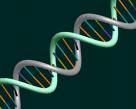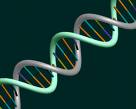About 1 in 4 adults may carry a gene, which when combined with taking aspirin may make them twice as likely to suffer a heart attack, according to US researchers.
Previous studies of aspirin, which is recommended to cut the risk of heart attack and stroke, have linked it to life-threatening internal bleeding. Others have cast doubt on whether healthy people should take aspirin as the risks could outweigh the benefits.
They have also found some do not appear to benefit from it, and while the risk of non-fatal heart attacks is reduced by 20 per cent, deaths from strokes and heart failure are not cut.

Dr Kathryn Hall, the report’s lead author, at Harvard Medical School said: ‘We need to look at ourselves as individuals, a certain constellation of genes, and to take that into consideration. If the research is validated in further study, it would be the logical next step to test everyone for these genes before giving them aspirin.’
In the UK last year30.9 million NHS prescriptions for aspirin were issued for those at risk of heart attacks and strokes.
The new US study involved examined 40,000 women over a ten-year period. Of those, 23 per cent carried a variation of the catechol-O-methyltransferase gene, which helps the body process stress hormones, linked to heart problems and stroke. And it was found that those who had the gene were naturally protected and were 34 per cent less likely to have heart attacks.
However, taking aspirin removed this protection and increased their risk of heart problems by 85 per cent – and, in some cases, by as much as three times.In contrast, another group who carried a different variation of the same gene were more likely to have a heart attack than those who did not carry the gene, but aspirin protected against this, cutting the number of heart attacks by 47 per cent.
The results raise the question whether aspirin should be given to all patients with risk factors for heart disease. And that doctors would be using modern genomics and genetics to identify those individuals for whom aspirin has the greatest benefit and the lowest risk of adverse effects. Tests for the genes are not currently available on the NHS.
Anyone with medical concerns should speak with their doctor rather than stopping to take their medication.






